
Multiculturalism and the Complexity of Division

Australia has long prided itself on being a multicultural nation, a melting pot of cultures and ethnicities that contribute to a vibrant, diverse society.
Yet, there has always been a narrative that multiculturalism is fragmenting the nation, threatening the cohesion that binds us together. This narrative, while increasingly prevalent, is deeply flawed and harmful. It not only misunderstands the true nature of multiculturalism but also ignores the complex layers of discrimination that exist within Australian society (including among white migrants).
In this thought-piece, I am ''attempting'' to explore why this divisive narrative has taken hold, why it’s incorrect, and the broader implications of denying the realities of racism in Australia.
Aaah Richa, so...how did we get here?
Historical Immigration Waves and Anxieties:
Australia's multicultural landscape has been shaped by successive waves of immigration, starting with European settlers and followed by post-World War II migrants from various parts of Europe, and later, from Asia, the Middle East, and Africa. Each new wave brought with it fears of cultural erosion and economic competition, often met with resistance from established communities. These historical anxieties have laid the groundwork for the current narrative that multiculturalism is dividing the nation.
Political and Media Narratives:
Certain political factions and media outlets have capitalized on these fears, amplifying the idea that multiculturalism leads to social fragmentation. By focusing on integration challenges and cultural differences, they create a narrative that pits "us" against "them." This rhetoric often gains traction during times of economic uncertainty or social change, when people are more susceptible to fear-mongering.
The Myth of a Fixed National Identity:
The notion that multiculturalism dilutes a singular, fixed Australian identity is a powerful but flawed argument. National identity is not static; it evolves over time, particularly in a globalized world. The idea that there is one "true" Australian identity that must be protected from external influences ignores the reality of our diverse population and the richness that this diversity brings.
Discrimination Within and Across Communities
The Unique Challenges Faced by 'White' Migrants:
While discussions on racism often focus on non-European migrants, it’s important to recognize that white migrants from countries like the UK, Ireland, and Eastern Europe also face discrimination in Australia. Despite their shared skin color with the local white population, many white migrants encounter prejudice due to their accents, cultural differences, or perceptions of "taking jobs." This discrimination within seemingly homogeneous groups reveals the complexity of racism, which is not just about skin color but also cultural and national identity.
The Denial of Racism in Australia:
A significant portion of the local white population believes that Australia is not racist, citing the country’s multicultural policies and the visible presence of diverse communities as proof. However, this perception overlooks the subtle and systemic forms of racism that persist. From microaggressions to institutional biases, racism in Australia often manifests in ways that are less overt but equally damaging. The experiences of white migrants who face discrimination challenges the broader narrative that Australia is a "post-racial" society.
The Impact on Social Cohesion and Individual Wellbeing:
The discrimination faced by white migrants can contribute to a sense of alienation and disillusionment, undermining social cohesion. When individuals feel excluded or discriminated against within their own ethnic or cultural group, it exacerbates divisions and fosters resentment. Moreover, denying the existence of racism in Australia prevents meaningful conversations about how to address and dismantle these prejudices, perpetuating the very divisions that it claims to refute.
And this leads to.....?
Social Polarization and Exclusion:
The narrative that multiculturalism divides fosters social polarization. When people are made to feel that their culture or identity is unwelcome, it creates an "us versus them" mentality, which can manifest in racism, xenophobia, and social exclusion. This division is not the result of multiculturalism itself but of the narrative that frames it as a threat.
Mental Health Impact on Discriminated Communities:
Migrants who are subjected to negative stereotypes or feel their cultural identity is under attack may experience higher levels of stress, anxiety, and depression. This not only affects individuals but also erodes the social fabric by creating distrust and resentment within communities.
Stifling Innovation and Progress:
Diversity of thought is a key driver of innovation. When multiculturalism is viewed negatively, it stifles the creative and innovative potential that comes from diverse perspectives. Australia’s future prosperity depends on its ability to harness the full range of its human resources, regardless of cultural background.
So, is Multiculturalism a Unifying Force then and, Not a Divider ?
Social Cohesion and Community Strength:
Contrary to the divisive narrative, research shows that multiculturalism actually strengthens social cohesion in Australia. A study by the Scanlon Foundation in 2020 found that over 80% of Australians support multiculturalism and believe it benefits the country. Furthermore, communities with high levels of cultural diversity often report stronger community ties and lower crime rates, demonstrating that diversity can lead to more cohesive, resilient communities.
Economic Contributions of Migrants:
Migrants bring significant economic benefits, contributing to a wide range of industries, from healthcare to technology. According to the Australian Bureau of Statistics, migrants have higher participation rates in the workforce, which drives economic growth and fosters collaboration across different cultural groups. This economic dynamism is a testament to the value that multiculturalism adds to Australian society.
Cultural Enrichment and Global Connectivity:
Multiculturalism enriches Australia’s cultural landscape, making it more vibrant and globally connected. This diversity is evident in the arts, cuisine, language, and festivals that Australians enjoy. Moreover, it positions Australia as a global player, open to international trade, tourism, and cultural exchange, which strengthens the nation as a whole.
It’s never too late to take a stand and change the narrative. Each of us has the power to reshape how we see and talk about multiculturalism in Australia. You can start by having honest conversations in your communities, challenge the stereotypes and biases that fuel division, and advocate for policies that promote inclusivity.
Share this blog, engage in dialogue, and most importantly, be an active participant in building a more united, equitable Australia. Together, Let’s let's redefine what it means to be an Australian—one that embraces diversity as our greatest strength.
In the spirit of unity and respect, I acknowledge and pay my heartfelt respect to the traditional custodians of Whadjak country, the Noongar people. I stand on this ancient land with deep appreciation for their enduring connection to country, culture, and community. As we gather and work together, may we honor the wisdom of the Noongar elders, past, present, and emerging, and strive to nurture a harmonious relationship with the land, its stories, and its people.


Facebook
LinkedIn
TikTok